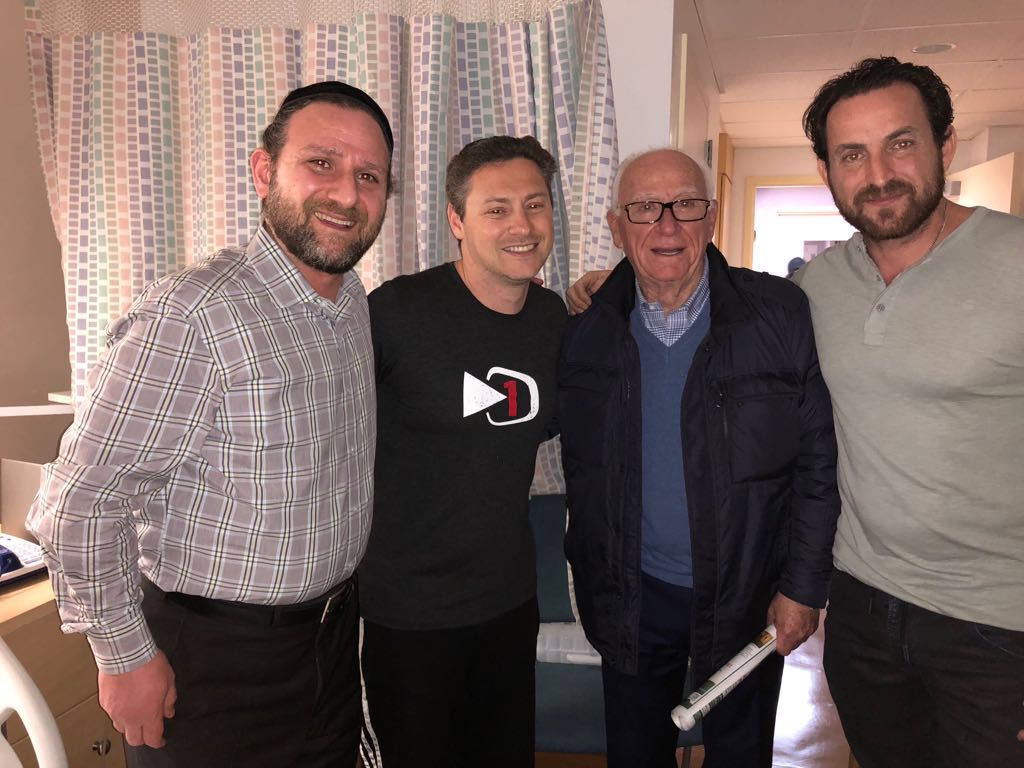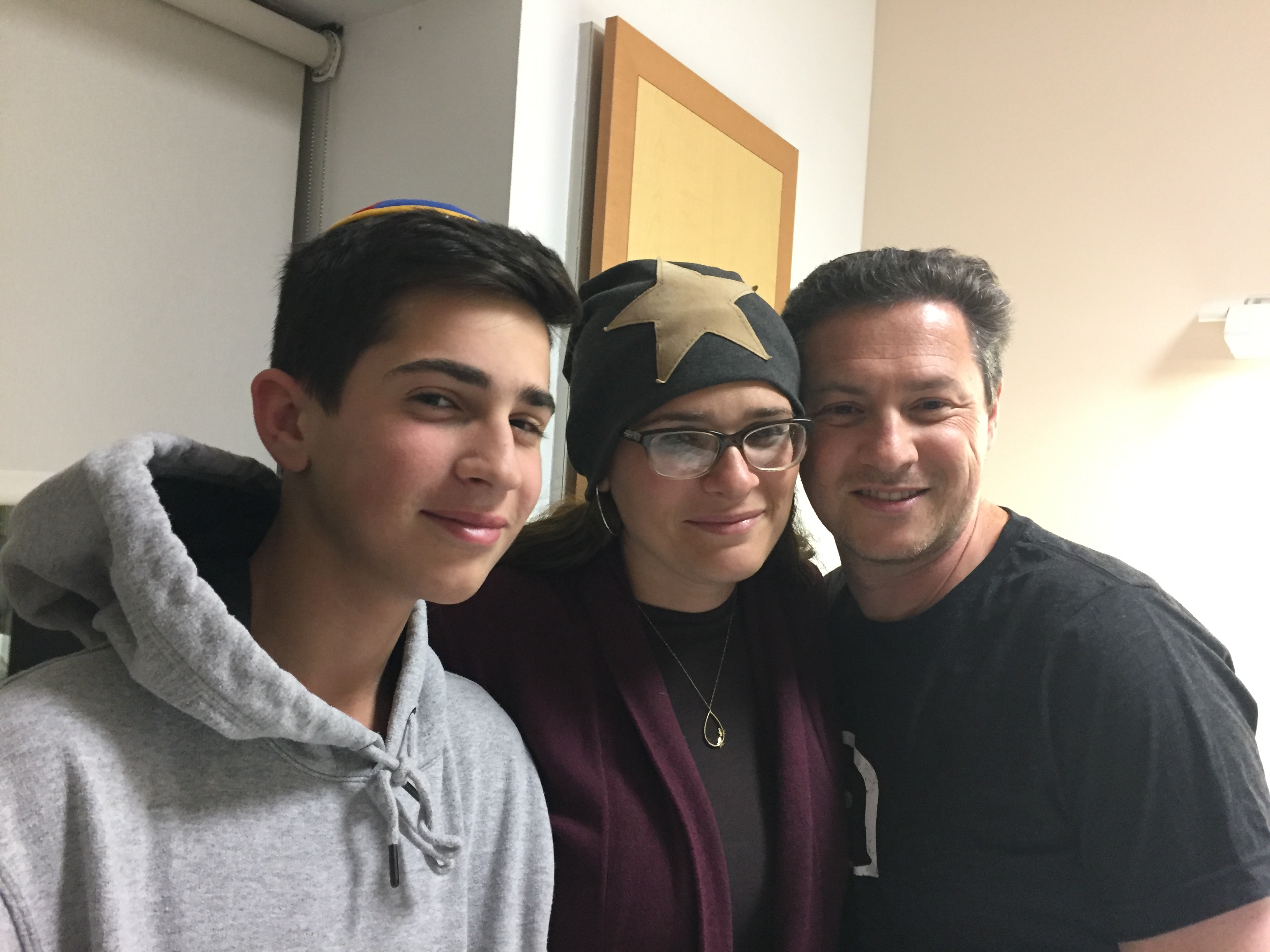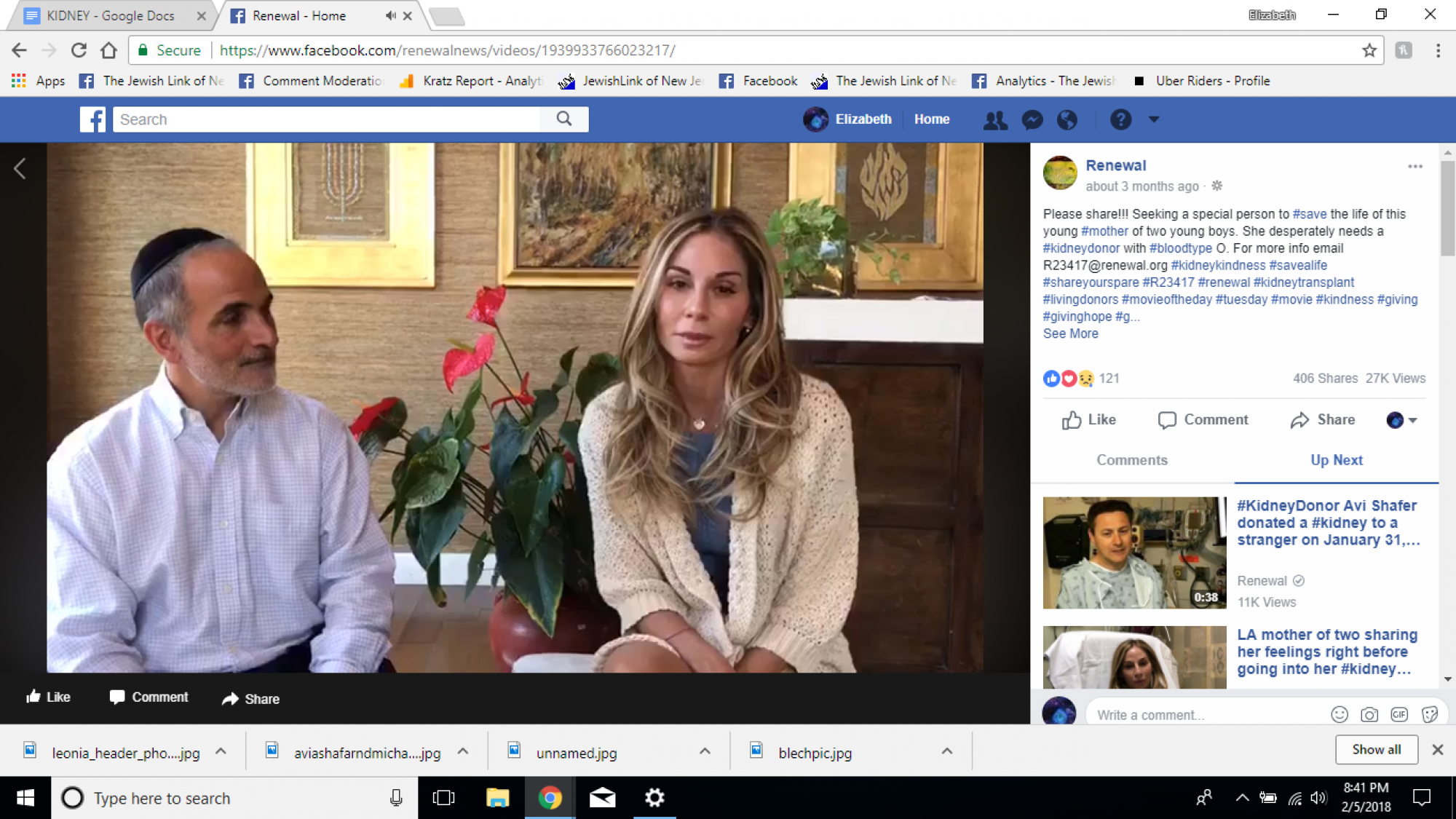Avi Shafar, a 40-year-old man from Teaneck, N.J., went to Montefiore Hospital in the Bronx last week and donated his kidney to someone he had never met. Immediately after transplantation, within a couple of seconds, the kidney was functioning, just as it should, for Ariane Mann, a 42-year-old woman from Los Angeles who had suffered from kidney, or renal, failure as a result of Type 1 diabetes. The next day, Shafar was fully mobile, ready and waiting to go home, but his doctors kept him a second night in the hospital just to be safe. Mann was expected to stay in the hospital a little less than a week.
Every person is born with kidneys—two bean-shaped organs that extract waste from blood, balance body fluids, form urine and aid in other important functions of the body. Kidneys can fail, causing catastrophic illness in people of all ages and ethnicities. Dialysis serves as a stop-gap measure, and is very taxing on the body. In recent years, it has become well-known that receiving a kidney from a living donor can work faster and last longer for a recipient than a cadaver kidney. Though risks are associated with any surgery, donors most often live perfectly well functioning with one kidney; the National Kidney Foundation notes: “Donating one kidney and living with one kidney, generally does not affect life expectancy or quality of life.” In fact, those who ultimately become kidney donors tend to be much healthier than the general population, due to the stringent medical testing donors face before they give, the foundation states.
Those in need of kidney most often seek the organ from family members, though family members are not always a match for the recipient or have other reasons why they can’t donate. Altruistic kidney donation is not exactly commonplace, but a Brooklyn organization, Renewal, is working to make it more so. Founded in 2006 in Brooklyn, Renewal was responsible for close to 15 percent of the total number of transplants to strangers in America last year. In 2016, it was responsible for nearly 25 percent of the total number.
The organization’s growth has been in stages, but the last several years have seen impressive progress. In 2016, Renewal facilitated 68 donations; in 2017, that number rose to 81. This year, by the end of January, Renewal had already facilitated nine donations. In the general population, more than 96,000 individuals in need of a kidney are registered on national registries. According to the National Kidney Foundation, 13 people in America die each day while waiting for a life-saving kidney transplant. To date, a little more than 350 people who need kidneys are registered with Renewal.

“A kidney transplant, literally, is a renewal of the recipient’s life,” said Rabbi Josh Sturm, Renewal’s director of outreach, who explained that 72 percent of people on dialysis do not survive more than five years. He added that the organization’s name, Re-new-al, is a play on the words “renal” and “new.”
Renewal works by providing comprehensive resources and assistance to those who need a kidney, and covers all costs to those who donate, including lost wages and transportation. (Testing and hospital fees are generally covered by the recipient’s insurance.) The organization does its best to provide every kind of information to those who are interested in testing to see if they are a match. Renewal staff also stays with the donor virtually every moment throughout their evaluation process and also from the morning of their donation until they leave the hospital, and work actively to keep in close touch afterwards. Funds for the organization come from private donors.
“The unfortunate reality is that many patients die while waiting for a kidney. And for many, the whole time they are on the transplant list, their condition is deteriorating,” explained Sturm. “A person cannot live without a kidney, and generally, most cannot survive long-term on dialysis. Renewal’s goal is to get people transplanted as quickly as possible.”
What’s different or special about transplants like Shafar to Mann? The only obvious thing these strangers likely had in common is that they are Jewish. The second, less obvious thing is self-selection; when Renewal told Shafar that he had the capacity to save someone’s life by donating his kidney to Mann, he didn’t hesitate to say yes.
The day after surgery, the two spoke to JNS separately about their experiences, several floors away from one another in the same hospital. “We need to be there for one another; there are different ways to do that,” said Shafar. “You can give money, you can give of your time; this is just another way to help someone. This is about helping people. We all have an achreis [responsibility] to be there for one another,” he said.
“I am hoping to heal, and I am hoping to help Renewal, somehow,” said Mann. She also described sitting in front of a piece of paper, trying to write words of thanks to her donor, but so far they had not come. “It’s not easy for me ask people for anything. I’m not that kind of person,” she said. “I don’t know how to thank him.”
Shafar, who works in finance and is a married father of four, took a swab test this past November at a Renewal event in New Jersey for his community rabbi, Rabbi Yosef Adler, who was celebrating a year of recovery following a kidney transplant coordinated through Renewal. Adler’s kidney was donated by his son, Zvi, who is a close friend of Shafar. A total of 89 other people were swabbed that night, and dozens matched names in the Renewal database. While not all of them will ultimately be able to donate, a number of these matches are moving forward.
While Sturm said this was not the biggest event Renewal has ever held, it was the first time they actually “ran out of swabbing kits.”
Jewish people may have a better chance of matching one another based on ethnic backgrounds, which was the original impetus for Renewal’s founding, but in the case of Shafar and Mann, it hardly seems to have been a factor. Shafar is of Ukrainian descent (Ashkenazi), and Mann is Lebanese (Sephardi).
“Renewal is an amazing organization,” said Shafar. “While most of us are in the business of living life, they’re in the business of saving lives. This would never have happened without them. We need to spread the word and make as many people aware of this life-saving organization as possible. They receive a lot of interest from people looking for a kidney and not nearly enough interest from would-be donors,” he said.
Mann, a fashion buyer, was told by her doctors that her kidneys were failing after she had her two sons, but until this past year, she felt OK. To keep “feeling OK,” she would need a kidney transplant if she expected to keep up her level of activity; she was facing the need to begin dialysis while also parenting two young boys and traveling often for work. Her brother, it turned out, was a match and was prepared to give a kidney to her. However, it wasn’t to be.
Several weeks before her brother was set to donate his kidney to Mann, he was severely injured in a skiing accident, breaking his spine in three places. “It was crazy. He’s professional skier,” said Mann. He was just taking his kids on the bunny slopes and tripped over something.”
Mann’s brother, while he is expected to fully recover, would not be able to donate his kidney for some time, if ever. In the meantime, Mann had started to feel “not so okay.” A friend put her in touch with Renewal several months ago, and she registered with the organization. She made videos, many of which went viral, in which she entreated the public to call Renewal to see if they were a match for her or others who needed a kidney.
Shafar, meanwhile, was already aware of altruistic kidney donation and the organization because his cousin had donated a kidney to a stranger, through Renewal, several years earlier. He explained that while he went to the Renewal event in Teaneck to support his friend Zvi, and his rabbi, he described getting “caught up in the moment” and deciding to swab.

“About a month after getting swabbed at the Renewal event,” he said, “I received a call that there was a mother of two young children facing dialysis without a new kidney, and that’s really all I needed to hear. I called Esty [my wife] and said, ‘This seems like a no brainer. We need to do this.’ She was very supportive. And that was it; there was no agonizing over it. It was actually a very easy decision.” Many people who donate kidneys say it’s one of the best decisions they’ve ever made; in fact, it’s a common refrain for donors to say, “My only regret is I can’t donate a second time.” Shafar’s feelings were no different.
“I’m so glad I did it. Besides for marrying the most incredible woman I’ve ever known and having four amazing children, it’s the greatest thing I’ve ever done. It’s amazing! I feel fortunate to have been the person to have given an incredible young woman her life back, two children their mother, a husband his wife, brothers their sister and parents their daughter back,” said Shafar.
How is it that Shafar so readily agreed to save a life? Is it because he knew people who had donated kidneys successfully before and had observed how speedy the recovery was?
Perhaps yes, perhaps no, according to Renewal staff. “Renewal’s donors share a common bond in that they are all regular people who decided to save a life,” said Chaim Steinmetz, Renewal’s director.
Deciding to get tested to be a match seems to be the overarching quality that donors have over other people. “It’s taking that step,” to decide to swab that is the hard part, Shafar said.
“Renewal needs help spreading the word about living kidney donation,” said Sturm. “Each donor helps to further normalize the idea of kidney donation as something that regular people are doing. The opportunity to save a life is tremendous.”
Anyone interested in finding out more about kidney donation should contact Renewal at info@renewal.org. Those interested in helping to organize an awareness event in their community to help spread the word should contact jsturm@renewal.org.


























